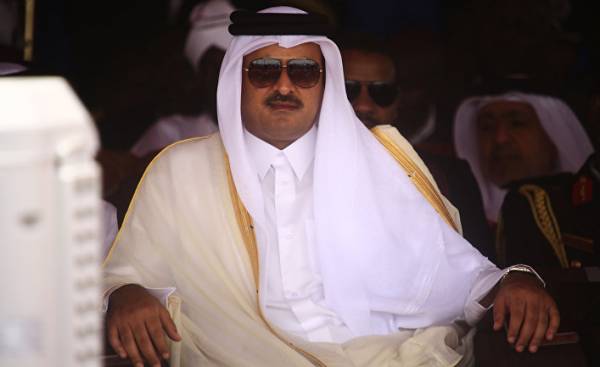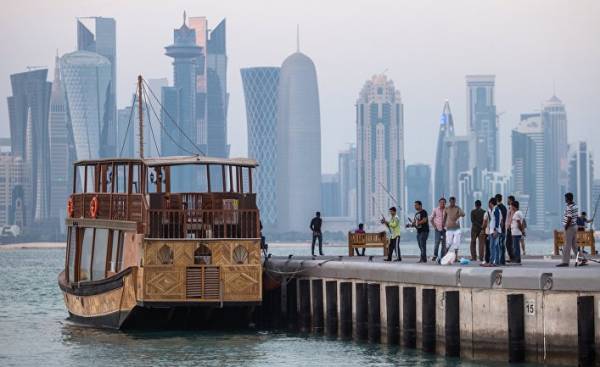
Doha — June 5 When the Arab Gulf States announced the severance of diplomatic relations with Qatar because of the relations of this country with terrorists, their signal was very clear: Qatar to keep a single with all regional policies, otherwise he will have to pay dearly. Nearly a week has passed, and Qatar seems in no hurry to concede. The conservation situation of schism contributes to the inconsistency of the foreign policy of U.S. President Donald trump.
The announcement of Qatar as a regional pariah is unlikely to change the country’s plans, and for two reasons. First, it’s just too rich that it could easily goad. Due to the huge reserves of natural gas, Qatar has the world’s highest income per capita. Qatar’s economy will not suffer much from the trade embargo and the travel ban imposed by Saudi Arabia, UAE, Bahrain and Egypt.
The second reason why Qatar can afford to wait calmly, not reacting to the actions of neighbors: the strategic importance of this country for the United States. Here is the air base al-Udeid air base, a forward operating base of America in its fight against ISIS (banned in Russia — approx. ed.). As a result, Qatar manages to deftly combine with Islamic extremists and good relations with the United States.
Connection of Qatar with the jihadi groups make the us angry, but at the same time, the US receives from them and use. For example, in may 2014, Qatar persuaded the Taliban to release an American soldier Bowie Bergdala. Three months later Qatar helped the release of Peter Theo Curtis, an American journalist captured “al-Nusra Front”, the Syrian branch of al-Qaeda. Qatar believes that communication with these groups — Hamas, the Taliban, al-Qaida — help alleviate their position and to persuade him to negotiate.
The largest neighbors of Qatar in the Persian Gulf, of course, looking at this situation differently, however, American diplomacy managed to maintain between them the world in the previous points of disagreement. But that was before. The administration of the trump demonstrates a lack of capacity to mitigate regional tensions. After the incident, a diplomatic rift trump has sharply criticized Qatar on Twitter, actually taking on some responsibility for the decision of Saudi Arabia and the UAE. This statement has complicated American policy: the Pentagon and the state Department were forced to choose a more neutral tone. A Pentagon spokesman praised Qatar for its “constant desire to maintain security in the region,” a state Department spokesman called the US relationship with Qatar “solid” and noted the efforts of Qatar, aimed at combating the financing of terrorism.
For many years Qatar has occupied a niche of the arbiter in regional conflicts. However, after the uprisings of the “Arab spring” of 2011 the country switched to an interventionist foreign policy, lax Islamists. This move has caused dissatisfaction with Egypt, Saudi Arabia and the UAE.
Bahrain Qatar has always had the best relationship. In 1986, between them there was a conflict over the disputed Islands. Today the Sunni rulers of Bahrain are dissatisfied with the friendly relations of Qatar with Iran, which they believe guilty of fomenting unrest in Bahrain, where the majority of the population — the Shiites.
These four countries are headed indicatorsso campaign: they closed the border with Qatar and its airspace to Qatari planes. In addition, they severed trade relations. Most of the Arab States of the Gulf have demanded that their citizens have left Qatar. And the UAE have even introduced criminal punishment for the expression of sympathy to Qatar in social networks.
The list of countries to sever diplomatic relations is impressive; it represents unity. However, it is important which countries in this list are not included. There are no Kuwait and Oman, although both countries are members of the cooperation Council for the Arab States of the Gulf (it also includes Qatar, Bahrain, Saudi Arabia and the UAE). Indicatorsi unit was not able to convince even the closest allies to follow his example.
Jordan has announced that it will lower the level of diplomatic relations without providing any details. If Qatar will be able to maintain relations with Jordan and Kuwait, the effect of the current campaign will likely be limited.
Moreover, all previous attempts to isolate the Arab countries, and much more vulnerable, ultimately failed. When Iran captured part of Iraq in 1986, the same Alliance which today denounces Qatar, demanded that Syria to limit ties with Iran. Saudi Arabia used the method of the carrot and the stick, for example, offered to replace Iran as the main supplier of oil to Syria. But, despite the fact that Syria has experienced serious difficulties due to the large balance of payments deficit, several years of drought and the reduction of foreign aid, it rejected the demands of the Saudi coalition.
 © RIA Novosti, Abdulkader Haj | go to fotobanka the waterfront on the West Bay of Doha, Qatar
© RIA Novosti, Abdulkader Haj | go to fotobanka the waterfront on the West Bay of Doha, Qatar
Qatar has soft to do with Iran, because these two countries together possess the world’s largest natural gas field — South Pars in the Persian Gulf. In addition, Iran has offered to supply 40% of the required Qatar food that the country has ceased to get out of Saudi Arabia because of the blockade. The risk that Qatar will be tightened too much in the Iranian orbit, is not very large, but any warming of relations between the two countries should be of concern to the US administration, since the main item of middle East politics trump the isolation of Iran.
However, the leadership vacuum created by the Americans, opened up opportunities for regional diplomacy in the current crisis as a mediator trying to play Kuwait. It is not excluded that the parties agree to depart from the brink in exchange for cosmetic concessions. But much more likely is the continuing tension for many months, if not years. The already fragmented middle East will continue to crack, stressing the inefficiency of the “General Twitter” of America.







